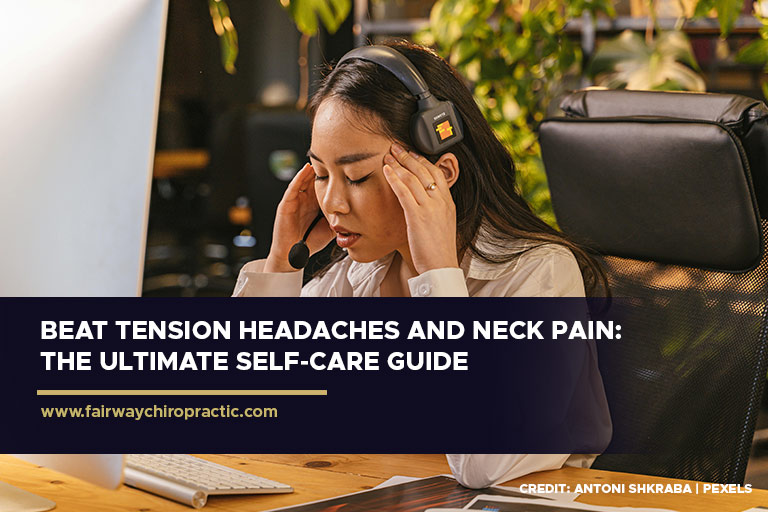Tension headaches and neck pain are a modern-day duo that can significantly disrupt your daily life. Whether it’s the constant ache from hunching over a computer or the dull throb brought on by stress, these issues can leave you feeling drained and frustrated. But fear not, warriors of wellness! This ultimate self-care guide equips you with powerful techniques to combat tension headaches and neck pain, empowering you to take back control of your comfort.
Understanding the Tension Headache and Neck Pain Connection

Tension-type headaches affect as many as 1 in 5 people worldwide. Tension headaches are characterized by a dull, aching pain on both sides of the head, often described as a tight band around your forehead or scalp. They can be triggered by various factors, including stress, poor posture, dehydration, and muscle strain in the neck and shoulders.
Here’s where the connection with neck pain comes in. Tightness and tension in the neck muscles can radiate pain upwards, contributing to tension headaches. Conversely, the discomfort of a headache can lead you to unconsciously tense your neck muscles, worsening both conditions.
Self-Care Strategies to Melt Away Tension
Manage Stress
Stress is a major contributor to both tension headaches and neck pain. Here’s how to combat it:
-
Identify and Address Stressors
Make a conscious effort to identify and address what triggers your stress. Can you delegate tasks? Set boundaries? Prioritize differently?
-
Engage in Activities You Enjoy
Schedule time for hobbies or activities that bring you joy and help you unwind.
-
Meditation
Just 10-minutes a day of mindfulness meditation can significantly reduce stress and tension. There are numerous guided meditations available online and through apps.
-
Deep Breathing
Take slow, deep breaths, inhaling through your nose for a count of four, holding for four seconds, and exhaling slowly through your mouth for eight seconds. Repeat this for several minutes to calm your nervous system.
-
Progressive Muscle Relaxation
Tense and relax different muscle groups throughout your body, starting with your toes and working your way up to your head. This helps release built-up tension.
Improve Posture
Poor posture puts undue strain on your neck and shoulders, leading to tension headaches. Here’s how to improve it:
-
Ergonomics
Ensure your workstation is ergonomically designed. Your monitor should be at eye level, your back supported by a chair with good lumbar support, and your feet flat on the floor.
-
Mindful Movement
Throughout the day, consciously check your posture. Sit up tall with your shoulders relaxed and rolled back. Stand with your weight evenly distributed on both feet.
-
Stretching
Regularly stretch your neck, shoulders, and upper back muscles. Gentle stretches throughout the day can help prevent tension build-up.
-
Maintain a Neutral Spine
When sitting or standing, ensure your ears are aligned with your shoulders and hips.
-
Take Movement Breaks
Get up and move around every 30 minutes to prevent muscle stiffness and improve circulation.
-
Heat Therapy
Heat therapy can help relax tense muscles and improve blood flow. Here are ways to incorporate it:
- Warm Bath: Immerse yourself in a warm bath for 20 minutes. Add Epsom salts for an extra dose of relaxation.
- Heating Pad: Apply a heating pad to your neck and shoulders for 15-20 minutes at a time. Wrap a towel around the heating pad to prevent burning your skin.
-
Ice Therapy
Apply an ice pack wrapped in a towel to your neck for short intervals (10 minutes) to reduce inflammation.
Essential Oils
Certain essential oils, like lavender and peppermint, have properties that may help ease headaches and promote relaxation. Here’s how to use them:
-
Diffuser
Add a few drops of essential oil to a diffuser and inhale the calming aroma.
-
Topical Application
Dilute a few drops of essential oil with a carrier oil like coconut oil and massage it gently onto your temples or neck.
Important Note: Always dilute essential oils before topical application and perform a patch test on your inner arm to check for any allergic reactions.
Hydration
Dehydration can contribute to headaches. Aim to drink plenty of water throughout the day to keep your body hydrated.
Gentle Stretching and Massage
Regular stretching can help improve flexibility and reduce muscle tension in your neck and shoulders.
-
Neck Stretches
Gently roll your head in a circular motion, side to side, and tilt your ear towards your shoulder. Hold each stretch for 15-30 seconds.
-
Shoulder Stretches
Perform arm circles forward and backward to loosen tightness in your shoulders.
-
Self-Massage
- Grab your thumb or two fingers, whichever feels stronger for you, and place them just behind your ear where you can feel a small indentation at the base of your skull.
- Press your thumb or fingers into this spot as you bring your chin down to your chest, then turn your head to the opposite side.
- Work your way from the outside toward the centre, pressing into each spot. You’ll likely find that some areas are more tender than others.
- Continue to move your fingers downward, and be prepared for some spots to be quite sensitive, possibly even bringing a tear to your eye.
- When you find an especially tender spot, hold the pressure there for about 5 seconds to stretch and release the tension.
- Repeat this process on the other side of your neck if needed.
When Self-Care Isn’t Enough
While self-care strategies are highly effective in managing tension headaches and neck pain, sometimes professional help is needed. If your headaches are frequent, severe, or don’t respond to self-care, consider consulting a chiropractor or other healthcare professional.
Chiropractic care can be a valuable tool in addressing the root cause of tension headaches and neck pain. Chiropractors use manual adjustments to improve spinal alignment and function, which can alleviate muscle tension and promote pain relief.
If you’re struggling with persistent tension headaches and neck pain, consider scheduling a consultation with Fairway Chiropractic Centre. Our team of experienced chiropractors can create a personalized treatment plan to address your specific needs.
Call us at 519-748-5535.











